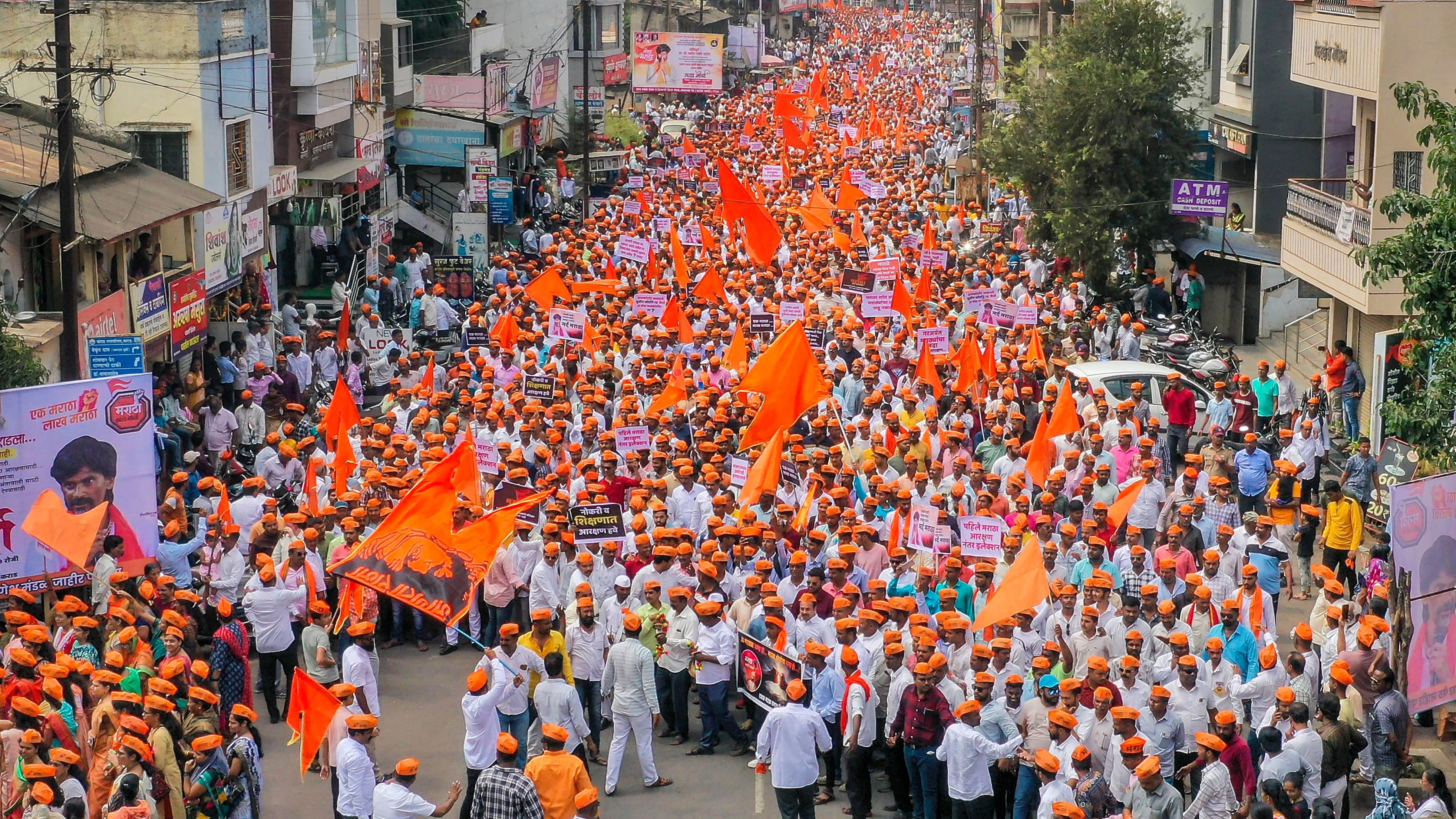
Activists of Maratha Kranti Morcha and Sakal Maratha Samaj during a march to press for Maratha reservation, in Karad.
Credit: PTI Photo
Mumbai: Maharashtra is in turmoil. The Maratha quota issue has been exhumed before two crucial elections—the Assembly and the Lok Sabha—and the result has been predictable. Street protests raged for days, a politician’s house was set afire, and a couple of demonstrators died by suicide. Caught flat-footed, the ruling government came up with garden-variety warnings and pleas.
Though the BJP-Shiv Sena-NCP coalition government has bought time till January, it is only a temporary reprieve. The issue could explode again next year if the protesting community doesn’t get what it wants, and it will have dire political consequences for the ruling class in an election year.
Marathas, who draw inspiration from Chhatrapati Shivaji Maharaj, comprise 33% of the state’s nearly 13-crore population and have been demanding reservation in education and jobs for the past four decades.
The demand first surfaced in 1983, when Mathadi labour union leader Annasaheb Patil started the Maratha reservation agitation and took out a rally to Mumbai.
The issue retreated into the background for three decades before taking centre stage with the rape and murder of a minor girl from the Maratha community in July 2016 at Kopardi in Ahmednagar district. This incident subsequently triggered several rallies, with one of the demands of the protesters being reservation for Marathas.
As the reservation demand gathered steam between August 2016 and August 2017, a series of silent protests were held across Maharashtra under the banner of the Maratha Kranti Morcha and Sakal Maratha Samaj, which generated massive support.
Now, the matter has flared up again, and agitators want a law soon.
The rural in trouble
Traditionally, Marathas have had large land holdings. A majority of sugar and milk cooperatives and educational institutions are controlled by the community. The community is the backbone of the state’s rural economy.
They also have a dominant presence in law-making and local bodies (more than 50% of MPs and MLAs are Marathas).
But over the years, the community’s land holdings have shrunk, and the agrarian crisis, which has roiled the rural heartlands of the state, has played a major part in changing their thinking.
With the traditional livelihoods threatened by the new economic order, Marathas, like other communities waging similar battles elsewhere, see quotas as a way out of this muddle, indicating a deeper social crisis; one that may pockmark the country’s landscape with more quota firestorms in the days to come.
The Devendra Fadnavis government created a special socially and economically backward class (SEBC) category to provide reservation for Marathas in 2018, but it was struck down by the Supreme Court in 2021 as it breached the 50% ceiling. Now, Manoj Jarange-Patil, the man who undertook fast-unto-death over the issue, has suggested a solution.
The protester wants Marathas to be given Kunbi caste certificates to get the benefits of reservation in the OBC category. Kunbi, a sub-caste of Marathas, is classified as OBC.
However, the OBCs are up in arms against any such possible move. The OBC community feels that if Marathas are given Kunbi certificates, their quota would be reduced.
Advocates Gunratan Sadavarte and Jayashree Patil have been highly critical of the Maratha reservation demand and opposed it in courts. "Reservation beyond 50% will cause reverse discrimination,” Sadavarte told the media on November 1, adding that “this reservation was provided only for political one-upmanship".
Sadavarte told DH that “Marathas are not a socially, educationally, and economically backward community”. On the other hand, he said, the government had cited "indebtedness and deteriorating incomes" to justify the Act, which was struck down.
Notwithstanding the brinkmanship of the protesters, the path to getting the quota will run into legal and political challenges.
If one looks at the issue politically, there is no immediate solution, though Chief Minister Eknath Shinde pressed the right emotional buttons — “I am a Maratha and a farmer. I come from a humble family. I assure you that I will give reservation”— to placate the agitators.
Even if a new law is enacted by calling a special session, it is going to be challenged in the Bombay HC or the Supreme Court.
As of now, it appears that it is going to be a long-drawn process. But political parties are quite clear on what they have to do. A leader from the Maha Vikas Aghadi laid it out.
"We have three elections pending ... the Lok Sabha, Vidhan Sabha and the local body polls, all of which are due in 2024. Antagonising the Maratha community is not something that one would dare to do. We have to take the Marathas along with us," the leader told DH.